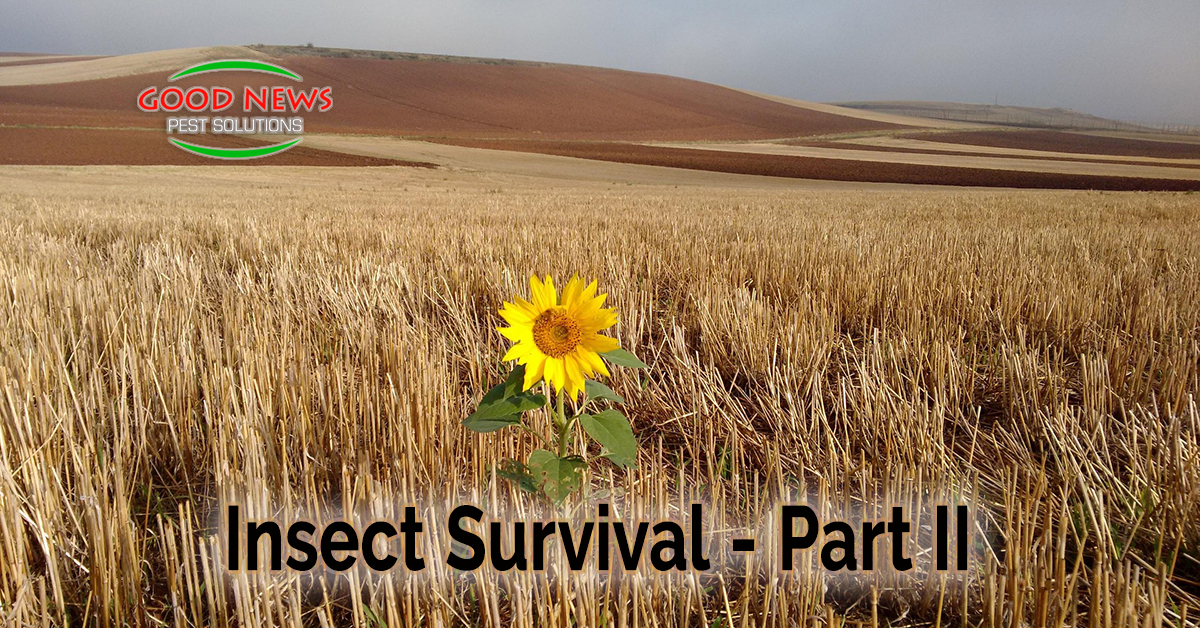
Insect Survival, Part II
There’s a popular meme floating around the interwebs where Albert Einstein is quoted as saying “If the bee disappeared off the surface of the globe, then man would have only four years of life left.” While the famous physicist never actually said those words, he did, in fact, spend time studying bees, fascinated with their ability to navigate using the polarization of sunlight.
Last week, we talked about how many insects seem to have been around longer than people. Mosquitoes and cockroaches are often given this designation. Roaches in particular are considered the ultimate survivor – able to live for a week without a head and maybe even survive a nuclear war!
Atomic Roaches
The rumor about these insects’ super survival started popping up after accounts of cockroaches emerging from the blast sites of Hiroshima and Nagasaki after World War II. They were unproven, but persistent. As the cold war and the nuclear arms race escalated, many believed Periplaneta americana would be the last creature standing if “the button” got pushed and our world was destroyed.
Back in 2008, the show MythBusters decided to test out the prediction and what they found was scary, but true. First off, yes, roaches would survive a nuclear blast. They are able to handle 10,000 rads – or about 10 times what a human being can survive. But they also found cockroaches to be on the low end.
Compared to the other insects, the roaches were no more resilient than humans. Meanwhile, flour beetles can survive a dose of 100,000 rads – 10 times as much as the cockroaches can handle. So if you ever see a flour beetle with glowing eyes – run!
Interconnected Ecosphere
While we tend to talk about the bees more than other insects, the life of every creature on God’s green earth is important for maintaining our world. As we’ve pointed out before, mosquitoes aren’t just annoying, they’re also one of the top pollinators. If bees go away, mosquitoes and butterflies will help us survive a little while longer at least.
One of the reasons we talk about the honeybees so much is because we can see their direct impact on our lives. But a decline in insects means less food for birds and fish, and subsequently, us. We can possibly fix the pollination problem with drones, but other animals can’t survive on mechanical replicas for food.
In 2020, entomologists started calling it the global insect apocalypse. The global insect population declines at an unprecedented rate – nearly 2% per year.
Global Impact
Just like insects can help humans endure, humans are also sometimes a danger to insects and other life. Some entomologists estimate that we lose 10–20% of all the insects on Earth every decade. Some of those losses are normal changes or the disappearance of rare bugs. But some of those declines in population are due to humans’ direct impact.
That can come in the form of new construction, habitat elimination, or accidental destruction when we transport invasive insects home with us and they attack the native insects – like what the murder hornets did with honeybees.
And while some insects have started building up a resistance – creating a whole different problem – the prolific use of harsh chemical pesticides also impacts insects – the ones we like as well as the ones we don’t.
While we can’t solve all the world’s insect problems, there are steps we can take at home to help them – and ourselves. You can start by planting native plants in your yard – here on the Gulf Coast of Florida, we call that Xeriscape and it also helps save water. You can also plant natural herbs in your yard or garden – mint, lavender and lemongrass, for example.
And as for those harsh chemical pesticides? There are greener, more effective, more naturally organic means of pest control. For the past 35 years, that’s been Good News Pest Solutions’ approach. Our Go Green Perimeter Plus treatment keeps our customers and their families and pets safe and it is better for the planet. For more details, or to schedule your first appointment, please give us a call!
« Back to Blog
Proudly Serving
Sun City Center, Ruskin, Palmetto, Parrish, Ellenton, Bradenton, Anna Maria, Holmes Beach, Bradenton Beach, Longboat Key, Lakewood Ranch, University Park, Myakka City, Sarasota, Siesta Key, Osprey, Nokomis, Casey Key, Venice, Englewood, North Port, Port Charlotte, Punta Gorda, Arcadia
Things You Can Do
Pay Your Bill Online
Leave Us a Review
Request a Free* Termite Inspection
Stop Mosquito Bites
Get Rid of Rodents
Get a Termite Damage Warranty
Get Pest Control for Your Attic
Get Pest Control for Your Business Request Prayer
Corporate Address
1080 Enterprise Court, Ste A
North Venice, FL 34275
Call Now: (941) 412-9610
Text: (941) 412-9610
Fax: (941) 412-0080
